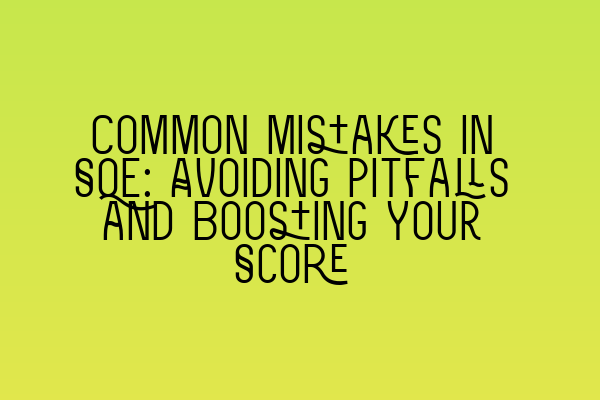Common Mistakes in SQE: Avoiding Pitfalls and Boosting Your Score
If you’re preparing for the Solicitors Qualifying Examination (SQE), it’s important to be aware of the common mistakes that many candidates make. By avoiding these pitfalls, you can maximize your chances of success and achieve a higher score on the exam. In this article, we’ll explore some of the most prevalent mistakes and provide tips on how to overcome them.
1. Lack of Proper Preparation
One of the biggest mistakes that candidates make is not dedicating enough time to prepare for the SQE. Proper preparation is crucial for success, as it allows you to familiarize yourself with the exam format, content, and time constraints.
To avoid this mistake, start your preparation early and create a study schedule that incorporates all the necessary topics. Use reliable resources such as textbooks, online courses, and interactive SQE mock tests for property practice. These resources will help you gain a comprehensive understanding of the subject matter and improve your exam-taking skills.
For essential tips and resources specifically tailored to property practice, check out our article on SQE Prep: Essential Tips and Resources for Success in Property Practice.
2. Poor Time Management
Managing your time effectively during the exam is crucial. Many candidates make the mistake of spending too much time on one question, leaving insufficient time to complete the rest of the paper.
To avoid this, practice time management techniques during your preparation, such as setting time limits for each question. Take advantage of interactive SQE mock tests for property practice that simulate exam conditions and help you develop your time management skills.
Remember, speed is essential in the SQE, so prioritize answering questions within the allocated time frames to maximize your score.
3. Failure to Read Instructions Carefully
Another common mistake is failing to read the instructions for each question carefully. Often, crucial details and requirements are provided in the instructions, and overlooking them can result in lost marks.
To avoid this pitfall, make it a habit to carefully read and understand the instructions before tackling the question. Pay attention to any specific requirements, such as word limits or formatting guidelines.
4. Ineffective Exam Technique
Having the knowledge is essential, but without effective exam technique, you may not be able to demonstrate your understanding and secure a high score.
Developing a strong exam technique involves practicing past papers, analyzing model answers, and identifying the key elements that examiners look for. Additionally, seek advice from experienced solicitors or tutors who can provide guidance on exam strategies.
5. Lack of Clarity and Conciseness
When answering the questions, it’s important to be clear, concise, and to the point. Many candidates make the mistake of providing lengthy explanations that lack precision, leading to confusion and potential loss of marks.
To avoid this, practice writing succinct and well-structured answers during your preparation. Use relevant case law and legal principles to support your arguments. Focus on answering the specific question asked and avoid unnecessary digressions.
Further Reading:
For additional resources related to property practice, check out the following articles:
- Interactive SQE Mock Tests for Property: Sharpen Your Skills for Exam Success
- Joint Ownership: Legal Considerations for Co-Owners of Property
- Commercial Leases: Essential Insights for Business Premises
- Tenant Rights in the UK: Understanding Your Legal Protections
By avoiding these common mistakes and utilizing the provided resources, you can enhance your SQE preparation and boost your score on the exam. Remember, consistency, dedication, and attention to detail are key to achieving success in the SQE.

Leave a Reply